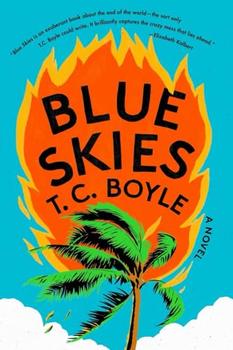Summary | Excerpt | Reviews | Beyond the Book | Read-Alikes | Genres & Themes | Author Bio

A Novel
by T.C. BoyleThis article relates to Blue Skies
 In T.C. Boyle's Blue Skies, environmentally conscious Ottilie tries her hand at raising her own livestock—not chickens or pigs, but crickets. In Western society today, people often react with horror at the idea of eating insects, but there are advantages to including them in your diet. Many insects are an excellent source of important nutrients, including protein, fats and various vitamins. They are a more sustainable source of these nutrients than more commonly consumed animal products such as beef, pork and chicken, because they require less land and produce fewer pollutants for the same amount of food.
In T.C. Boyle's Blue Skies, environmentally conscious Ottilie tries her hand at raising her own livestock—not chickens or pigs, but crickets. In Western society today, people often react with horror at the idea of eating insects, but there are advantages to including them in your diet. Many insects are an excellent source of important nutrients, including protein, fats and various vitamins. They are a more sustainable source of these nutrients than more commonly consumed animal products such as beef, pork and chicken, because they require less land and produce fewer pollutants for the same amount of food.
Our aversion to eating insects is cultural, not innate; roughly two billion people around the world regularly eat insects. Termites are commonly eaten in Africa and Australia. They have a higher protein content than beef, and the queens are also high in fat. Locusts and other grasshoppers are also commonly eaten in Africa and Asia. Many types of larvae, including caterpillars, beetle larva and fly larva are eaten across the world. People who eat insects often compare them to shellfish, for good reason—both are arthropods, and they are closely related enough that it is recommended people with shellfish allergies proceed with caution when trying insects, as there is a high risk of triggering an allergic reation.
Some of the aforementioned food traditions involve catching wild insects, but many believe insect farming could provide a sustainable increase in food production for the ever-growing human population. In Madagascar, cricket farming is reducing food insecurity without destroying more of the country's already threatened forest, as would be necessary with other types of agriculture. Farming insects is also more ethical than other types of factory farming, because insects can be kept in large groups indoors without compromising their quality of life. As with all food production, insect farming requires careful attention to make sure the products are not spoiled or contaminated. However, there is actually less risk of some types of food borne illness than with most livestock due to the fact that insects are so different from humans biologically. Far fewer of the diseases that affect insects are a danger to us compared to those that affect pigs or cows, for instance.
There have been multiple attempts to bring insects into the mainstream Western diet. While some have gained a niche popularity, most have failed. Today, many are taking a less direct approach by selling food products made from insects, rather than whole insects, and farming insects to use as feed for other animals. Hey Planet, a Denmark-based company, uses insect powder and plants to produce substitutes for traditional meat products like patties and meatballs. They've recently announced their plan to expand into the US market. Similarly, the Italian company Small Giants (whose products are available in the EU and UK) produces crackers and "crispy bakes" containing crickets. Francesco Majno, co-founder of Small Giants, said of this strategy: "We believe that the only way to tackle the yuck factor is by giving insects a familiar form that can help anyone to try them the first time and to understand how tasty and nutritious they are."
Filed under Nature and the Environment
![]() This "beyond the book article" relates to Blue Skies. It originally ran in June 2023 and has been updated for the
May 2024 paperback edition.
Go to magazine.
This "beyond the book article" relates to Blue Skies. It originally ran in June 2023 and has been updated for the
May 2024 paperback edition.
Go to magazine.
Your guide toexceptional books
BookBrowse seeks out and recommends the best in contemporary fiction and nonfiction—books that not only engage and entertain but also deepen our understanding of ourselves and the world around us.